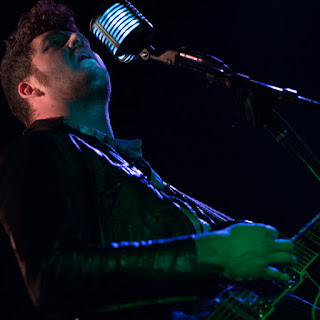Air Traffic Controller. Late last year, I got a press invite to see Air Traffic Controller at The Satellite. I'd never heard of them. I took a listen to some of their songs and was sold. Off I went and totally enjoyed myself. Speed forward 6 months and I learned that this Boston based band was heading back to Los Angeles. Even more of an incentive, they were playing a free show at The Satellite.
I checked The Satellite website to see what time they were playing and it listed them playing at 11 p.m. Ha, luckily, I showed up at 9:45 p.m., because the schedule got changed and they were on at 10 p.m. What did the intimate crowd get treated to? A wonderful 1 hour 15 minute set. Their sound is some of the most intricate pop-rock play you'll ever hear. You get a vocal sonic exchange between lead singer Dave and bassist Casey. Then all the instruments provide perfectly blended melodies that just hook you with their catchy vibe.
What did I notice: there were some amusing self-inflicted technical difficulties. First, during one song, the lead singer, Dave, didn't properly plug in his microphone. The plug loosened up and he had to switch to Casey's microphone. His band mate noticed the situation and re-plugged the microphone. Second, again Dave caused some self inflicted technical difficulties. He picked up his guitar and nothing was coming out of it. He'd failed to turn it on.
What did I notice 2: their producer, Bleu, was in the audience and decided to jokingly heckle them. The band, "We've got two songs left." Bleu, "One more song! One more song!" Of course, someone had to follow-up that heckle with another after they finished the first of the two songs. With everyone expecting the second song, someone yelled out, "Encore! Encore!"
Well, hopefully, you can see that not only was it a beautiful hour plus of Air Traffic Controller music, but it was also just a fun, relaxing atmosphere.















